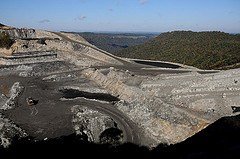Technological Progress for Dummies
by Brian Czech
 Not you, CASSE signatory. You’re no dummy. You already know that the fundamental conflict between economic growth and environmental protection can’t be overcome with technological progress.
Not you, CASSE signatory. You’re no dummy. You already know that the fundamental conflict between economic growth and environmental protection can’t be overcome with technological progress.
But we’re all dummies about something. Most of us are dummies about toothpick manufacturing, for example. Toothpick dummies range from presidents to pot-scrubbers. So do plasma physics dummies, Arabic language dummies, and root canal instrument dummies. So don’t take this the wrong way if you think technological progress can overcome the conflict between economic growth and environmental protection. You may be wrong about that, but you are legion!
Now among dummies, there’s dumb and dumber. That’s just the way it is. But toothpick dummies and other specific dummies can be smart overall. So the generally smart and smarter are specifically dumb and dumber.
Technological progress sure brings out the dumb in the smarter. This I discovered by trying to get scientific organizations to adopt positions on economic growth. Invariably, the biggest hurdle was the notion that, with technological progress, economic growth and environmental protection could go hand-in-hand.
And frankly, it is an extremely difficult notion to refute, at least in plain language. It’s different if you’re a physicist; you probably get it immediately. You know that, no matter how much invention and innovation, you can’t make something from nothing and you can’t get perpetually more efficient. You know it because you’re steeped in the first two laws of thermodynamics.
But there we go, with “laws of thermodynamics,” already outside the vernacular, way beyond plain language. Few among us are physicists. Legion are we thermodynamic dummies, from presidents to pot-scrubbers.
That doesn’t mean you must be a physicist to get it. Farmers tend to get it too, as do many people who work with their hands, city or country. The fact that you can’t make something from nothing, that you can’t have your cake and eat it too, is really a matter of common sense. Or it should be.
The problem is that common sense is not very common any more. It’s been vanquished by disingenuous marketers, truth-bending politicians, and scholarly “smart-dummies” (generally smart, specifically dumb on technological progress) who have legions thinking there is no limit to economic growth. But surely it’s not far below the surface. Surely there is latent common sense to invoke.
For several years in the early 2000’s, I looked high and low for a thorough explanation of why technological progress could not reconcile the conflict between economic growth and environmental protection. I felt I had common sense — horse sense, farm sense, construction sense — and I couldn’t believe the best-selling authors blathering about perpetual growth in the “information economy” and the politicians chanting the mantra, “there is no conflict between growing the economy and protecting the environment.” All this was based on a fuzzy notion of technological progress, and had most Americans (64% according to a Roper poll) believing there was no limit to economic growth. So I searched for scientific literature to refute the fallacious rhetoric.
Much to my chagrin, there was almost nothing. There were rigorous explanations for limits to growth, most notably by our Daly News namesake. Herman Daly had used laws of thermodynamics to demonstrate limits to growth and to advocate a steady state economy. He and others also described how economic growth required natural capital, which helped to explain the basic trade-off between growth and environmental protection. All this implied that technological progress could not reconcile the trade-off, at least in the long run, and here and there were statements to that effect.
There were also critiques of technological progress that were focused less on limits to growth and more on cultural impacts. Perhaps the most famous was by E. F. Schumacher in Small is Beautiful. Schumacher called for “appropriate technology.”
Yet there seemed to be a missing concept. Nowhere was there a thorough, rigorous, and compelling explanation for why technological progress could not allow a nation, or the world, to continue growing the economy without necessarily degrading the environment in the process. After all, there seemed to be many examples of technological progress that helped protect the environment, even in the midst of rapid economic growth. These examples, along with the lack of a rigorous trade-off thesis, explained why legions were unwilling to acknowledge limits to growth, or even a trade-off between economic growth and environmental protection.
It also explains why very smart dummies in academia, government, and the private sector are paid handsomely for “science and technology policy” affairs. These folks are often brilliant in general terms, and about many specific topics, yet many are dumber than a boot about the relationships among economic growth, technological progress, and environmental protection. Invariably they recognize that economic growth and technological progress are tightly linked, and they know that many new technologies are “greener.” They therefore figure it’s a slam dunk that economic growth may be reconciled with environmental protection via technological progress. For them, the object of science and technology policy is to steer science toward providing technological progress, thereby growing the economy and protecting the environment. It’s a classic win-win!
Partly because they’re paid so handsomely, jetting from conference to conference, most others think they must be experts on the subject. They should, therefore, be believed. Meanwhile, because their win-win message is political gold, politicians find them useful. Smart-dummies are appointed to high governmental posts, becoming more credible yet in the eyes of the public.
If you go to a typical science and technology policy conference, you’ll find one group of speakers talking about where the money for science is coming from or could come from. Another group will point to where the money is going; what kind of science is being conducted, who is conducting it, and what new technologies are coming online as a result. Another group will address what it means to the environment, and another will address what it means to the economy. Keynote speakers weave these threads into the tired message that we need newer technology and therefore more science – we’ll just have to find funding for it – so we can continue growing the economy while protecting the environment. Then it’s time for wine and hors d’ oeuvres and planning for the next highfalutin conference.
Clearly we have to look elsewhere for a clear description of why the conflict between economic growth and environmental protection cannot be reconciled with technological progress. Ideally this description would not rely exclusively on the laws of thermodynamics, either, but could be put in much plainer language. That would make it relevant to the public and policy makers.
When I found no such description during those years around 2000, I decided to attempt it myself. The experience was daunting and taught me how easy it would be to slip into accepting the idea of perpetual economic growth, or at least the idea of reconciling growth with environmental protection for extended periods of time. But I got lucky in stumbling upon an overlooked concept — maybe the overlooked concept in these matters. It’s a concept necessary to explain how economic growth and technological progress can continue in lockstep, but not without environmental degradation. It’s actually a well-known concept in the economics profession, but hadn’t been applied to the issue at hand. I stumbled upon it while studying the methods and findings of national income accounting, especially the findings of the late Edward Denison, a pioneer in the measurement of GDP.
Now I won’t claim that the concept — “economies of scale” — is exactly plain language either. Yet it is much plainer than laws of thermodynamics. For one thing, far more citizens are businessmen than physicists, and economies of scale resonate with them.
I wrote it all up in a peer-reviewed paper published in 2008 for the journal Conservation Biology. The paper isn’t plasma physics, but neither is it plain language. So I haven’t yet completed the plain-language part of the task. There’s no better place to try than the Daly News.
Frankly, I’m not sure I can do it, and I’m not sure it can be done by anyone. The topic may be just tricky enough to defy the vernacular. We’ll see how it goes in the conclusion of this two-part column next week…








Another question, one that may have the tendency to cause the development of new synapses prior to answering is; “Is there an inherent conflict between growing the ecology and protecting the economy?
check out Bottleneck by William R. Carton Jr., which explains what you’re trying to say – as far as I understand. he gives reasons for why technological progress won’t change the fact that we are living beyond carrying capacity. and currently with a carrying capacity deficite. And David MacKay’s Sustainable Energy – without the hot air, gives a purely fact-based scientific breakdown of how Mich renewable energy we can generate, how it won’t be enough, how much we need to cut down, etc.
William Greider does a great job in his book, The Soul of Capitalism. I’ll have to look at it again. Jared Diamond’s Collapse also is in my holster, and must reveal some good ideas. The question reminds me of Global Warming Climate Change’s big challenge, that is, that it is such a large scale, long term process that it escapes most peoples’ vivid imagination. In that case, I’ve tried to keep sight on the connections between melting glaciers and rivers, and was energized to learn that Rockie Mountain snowpack is being affected like glaciers around the world, and will affect US waterways. Al Gore’s picture book did a great job, for that matter, in planting various vivid points he made in his documentary.
As for the impossibility of unlimited growth, I think the challenge involves understanding the specific reasons people give in specific contexts, but no less involves the assumptions of the Steady Stater making the argument.
The latter point involves whether the Steady State argument is a dead end argument, whether “Steady Stateness” is clearly envisioned for what it must actually be. It is not now, and will not be, an abstraction. It will be a real and present reality analogous to existing efforts to create green business and industry. In this respect, I suggest Greider and Diamond, and Michael Conroy’s Branded. As I gradually realized in my years as a food co-op member in NYC and in researching my master’s thesis on community wind energy, a lot of the solutions are already happening in our own towns, states, countries, or on the other side of the ocean.
At geo.coop, Ethan Miller has published a masterpiece. I have read a piece of his previously on the solidarity economy, and have known of his involvement with the movement.
His recent piece is titled “OCCUPY! CONNECT! CREATE! – Imagining Life Beyond “The Economy” and does an excellent job of deconstructing the assumptions concerning the popular phrase “the economy,” and his discussion is related to the one here at CASSE, and the challenge Brian Czech poses in this post.